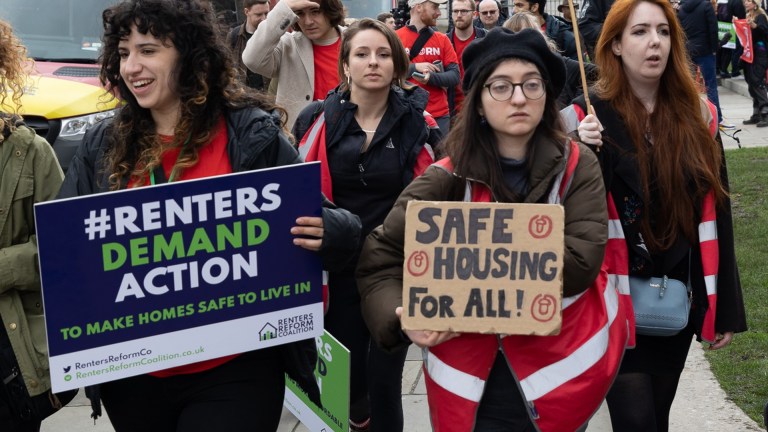How to get out of a fixed term tenancy
Ending a fixed term tenancy early, known as breaking the lease, is not always straightforward. In most cases, you can’t just up and leave a fixed term tenancy without facing some consequences. However, there are exceptions.
Check your tenancy agreement for a break clause. This clause allows either party to end the agreement early under specific conditions, typically after a certain period (six months into a one-year lease, for example).
If there is no break clause in your contract, you might be able to negotiate with your landlord to end the fixed term tenancy early. If they agree, get this in writing to avoid future disputes.
Private landlords will often offer you a deal to end a fixed term tenancy early. This might require you to forfeit your deposit, or to find a replacement tenant yourself. They might also want to charge you a fee for moving out early, but they can only charge you enough to cover reasonable costs and should give you a breakdown of what those costs are if you ask for it.
In extreme situations, such as if the property is in uninhabitable condition or you’re facing harassment, you might be able to use these things to negotiate an early end to your tenancy. But without a break clause or written agreement from the landlord, there are no guarantees – so make sure you get legal advice before taking any action to avoid being out of pocket.
The “constant threat of losing their home and lack [of] proper process to challenge” landlords are leaving tenants stuck in shoddy flats and houses, according to Citizens Advice.
Nearly five million renters in Britain are living with cold, damp or mould as a result of a “generational decline in living standards for renters,” the research said.
”Private renters are paying through the roof for increasingly decrepit housing which eats up their hard-earned cash and puts their health at risk,” said Dame Clare Moriarty, chief executive for the organisation.
“To make matters worse, renters have little power and live with the constant threat of eviction hanging over their heads.”
The inability to end a fixed term tenancy early due to poor conditions in the home is leaving tenants facing a dilemma – stay in hazardous housing, or complain to the landlord and risk eviction which could affect their chances of renting somewhere new.
Notice required to end a fixed term tenancy
If there is a break clause, it will usually specify the notice period required – often two months. Without a break clause, and if the landlord doesn’t agree to end your tenancy early, you may still be responsible for paying the rent until a new tenant moves in.
If you’re sure you want to end your tenancy, follow these steps:
- Check your tenancy agreement for a break clause or any terms regarding early termination. Understand what is required to activate this clause if it exists
- Speak to your landlord with a proposal to end the tenancy early. They might be open to negotiation, especially if they can find a new tenant quickly. Contact the letting agent first if you rent through one
- If your landlord agrees to end the tenancy early, make sure you get this agreement in writing. This protects you legally and provides a clear record of the what has been agreed
- Landlords are sometimes more willing to let you end the tenancy early if you can find a replacement tenant. You might advertise online, or ask around friends and family for someone looking to rent
- If you believe you have grounds to terminate the tenancy due to severe circumstances, consult a solicitor or housing advisor. They can guide you on the best course of action.
How to end a periodic tenancy
Ending a periodic tenancy is generally simpler than ending a fixed term tenancy. You must provide notice, typically one month if you pay rent monthly or four weeks if you pay weekly, though this can vary slightly depending on where you are in Britain. This notice must end on the last day of your rental period.
Ensure your notice is in writing and states clearly when you plan to leave. Double-check that your landlord has received and acknowledged your notice – misunderstandings could lead to real challenges later.
What happens if I can’t pay my rent?
If you’re struggling to pay your rent, it’s crucial to take action quickly. Your first step should be letting your landlord know about your situation – they may be willing to work out a payment plan.
Check if you’re entitled to benefits which you’re not already claiming using a benefits calculator like entitledto. Advisers at Shelter for your region can give expert advice tailored to your situation.
If you’re in arrears, your landlord can start eviction proceedings, but they must follow legal processes. For comprehensive advice, find out how to get help with rent or help with rent arrears.
Moving out checklist
When it’s time to move out, whether at the end of a fixed term or after giving notice on a periodic tenancy, there’s plenty to do. Make sure you tick these essentials off your list in the process:
- Give proper notice: Ensure you’ve given the correct notice period, if applicable, and received acknowledgment from your landlord
- Clean the property: Leave the property in good condition. This includes deep cleaning, repairing any damage, and ensuring the garden (if any) is tidy
- Inventory check: Go through the inventory list with your landlord or letting agent. Make sure all items are accounted for and in the same condition as when you moved in
- Return the keys: Hand over all keys to the property, including those for shared areas and post boxes
- Final bills: Settle all utility bills and tell providers that you’re moving. Redirect your post to your new address
- Get your deposit back: Request the return of your deposit from the tenancy deposit scheme where it’s held, unless you agreed to let the landlord keep your deposit in exchange for ending the tenancy early. Dispute any deductions you believe are unfair
Ending a fixed term tenancy can be a daunting process, especially if you’re dealing with money worries or sudden changes in circumstances. Always read your tenancy agreement carefully and get legal advice if necessary.
Do you have a story to tell or opinions to share about this? Get in touch and tell us more. Big Issue exists to give homeless and marginalised people the opportunity to earn an income. To support our work buy a copy of the magazine or get the app from the App Store or Google Play.









